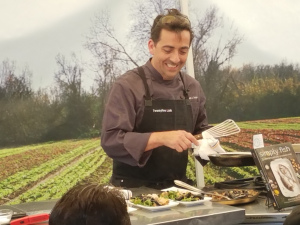It’s estimated that at least 50,000 people in California at least occasionally sell meals that they cook at home. Most of them have no idea that what they are doing is illegal. Normally, no one bothers them. This is not because no one wants to enforce the law, but rather because the county health departments which are in charge of enforcement could not keep up with such a volume of activity. And there are political consequences to enforcing a law that people do not generally approve of once they are aware of it. However, health departments do occasionally cite individuals, usually in a public way, so that the citation acts as a deterrent to others.
The Homemade Food Operations Act (AB 626), would change this, making it legal to sell certain meals made in a home kitchen in California. This bill is in its final leg through the state Legislature: it will be heard by the State Senate in August and should find its way to the governor’s desk from there. It’s been a long journey.
First proposed in 2016 as AB 2593, by Assemblywoman Cheryl Brown (San Bernardino), with sponsorship from the Internet platform Josephine, which was working to organize home cooks, the bill met with a lot of resistance, significantly from health officials, who worried about its implications to food safety and public health. Quickly shelved for the year, the current version of the bill was introduced by Assemblyman Eduardo Garcia (Riverside), with continuing sponsorship from Josephine. This version of the bill has been winding its way through the legislature for the last year and a half, getting amended, picking up supporters and opposition, losing its original sponsor Josephine, which went out of business, but getting a new sponsor in the C.O.O.K. Alliance, a community group formed by the founders of Josephine and community advocates. Somehow through all of this, the bill has survived and is on the verge of becoming law.
Why a Homemade Food Operations Act? We can trace the origins of this law back to a predecessor, the Homemade Food Act (AB 1616), also known as the Cottage Food Law, of 2012. This law, championed by Assemblyman Mike Gatto (Los Angeles) and sponsored by the Sustainable Economies Law Center (SELC) was inspired by the raid of home baker Mark Stambler, who had been selling his bread to local restaurants, something not then allowed under California law. Passage of this law, which was also met with resistance, permitted the production of small quantities of certain “non-potentially hazardous” (think shelf stable) foods, like breads, dried fruit and jams, to be sold from home kitchens by licensed producers.
Some people have noted that the foods permitted under the Cottage Food Law are not the healthiest. Some shelf stable foods are made stable by adding lots of sugar and permitted cottage foods do tend to be sugary. This may be true, but that was not the main reason for passing the law. Rather the Cottage Food Law was a step toward re-localizing food production, allowing home-based food businesses to exist, whether as a side-line for a homebound person, or as a starter kit for a potential new business, which if successful would move into its own facility. It was an attempt to boost local economies. It acknowledged that home food production was happening anyway, and that licensing even part of it should make it safer (not that there were reports of homemade food creating significant health problems to begin with). It began a process of re-connecting people to their food, giving them new channels to buy local food from people they know, rather than buying food from unknown sources at large grocery stores.
Since 2012, a number of other bills have passed through the California Legislature which have also acted to re-connect people to their food. Some notable bills that have become law include the Neighborhood Food Act, which created a right for citizens to grow food in their backyards and on patios, the Seed Exchange Democracy Act, which enshrined the right of libraries and other community groups to hold seed libraries and seed exchanges of small amounts of local seeds, and the Urban Agriculture Incentive Zones Act, which gives communities the right to give private landowners tax incentives for dedicating their property to agriculture. We seem to be on a roll.
The Homemade Food Operations Act is arguably then only the latest in a series of bills to re-connect people with their food. It is not even alone in 2018, as the Safe Sidewalk Vending Act (SB 946) authored by Senator Ricardo Lara (Los Angeles), which is also working its way through the legislature, would also work to re-localize food by legalizing sidewalk vendors throughout California and so making them safer. And it will not be the last. Food advocates have ideas for future bills which will continue this work.
Of course, this bill is not without controversy. Besides the food safety and public health issues raised by health officials, concern with Internet platforms gaining too much control over home cooks – the “Uberization” of homemade food – and concern by counties who don’t feel that they can afford to implement the law have been raised. Look for future blog posts which dive into these issues. And for ways that you can support the bill during its final passage through the legislative process.
Photo: Professional chef at a licensed cooking demo in San Francisco. By Peter Ruddock.
Full disclosure: Peter is an advisor to the bill’s sponsor, the C.O.O.K. Alliance.





